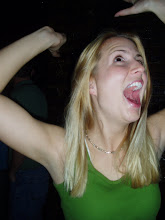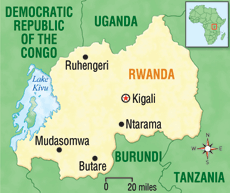Over the course of the past couple weeks, our Peace Corps group has been visiting nearby health-related institutions in order to gain further technical information and to get our first glimpse of the facilities available to Rwandans.
Our first visit was, in small groups, one of six nearby health clinics. My group went to a health clinic outside of Butare that offers a comprehensive range of services, from basic consultations and pharmaceutical services, to voluntary counseling and testing (VCT), family planning, and even health education seminars. The health clinic was almost more of a health campus, with separate buildings for the different areas of service. The health system structure in Rwanda works such that, if you have health insurance, you pay a flat fee akin to a co-pay, but this pays for both the consultation and any If you are given a prescription in your consultation, you simply stand in line at the pharmacy window (located in the same building as your consultation) and wait for you medicine. Severe cases are referred further up the system, and in the case of this clinic, are typically taken to the University of Rwanda hospital in Butare, one of the best hospitals in Rwanda. While we were there, we saw a women get in an ambulance holding an IV in one hand. Also while at the health clinic, we saw a mother who had just had a baby that morning. She was lying in one bed and the baby, tiny as could be with huge brown eyes, was wrapped (almost swallowed) in a blanket on the bed next to her. Meanwhile, the father of the baby lurked around outside their room, fetching water and looking as proud as could be. Rwandan hospitals differ from hospitals in the United States in that the hospitals don’t feed their patients- the patient’s family members are required to bring and cook them food. Often, too, the bulk of caring for the non-health essential needs of the patient falls on the family members.
In addition to the health clinic, we visited both an orphanage for OVCs (orphans and vulnerable children) and a women’s center this week. Orphanages are always a tough place to visit, no matter where you are. It seems as though orphanages are the stereotypical place that foreigners visit in Africa, thinking that they can somehow help by holding or playing with the children- perhaps they are helping in the moment, but in the long run, they simply serve to crush the hopes of the children in the orphanage and don’t create any sort of sustainable change for the orphanage. I think orphanages are difficult because ideally all OVCs should be placed with a family, but this just isn’t reality. While Rwandan families do often take in orphans, as we have found within many of our resource families, often those are extended family members instead of just children off the street. At the orphanage we visited yesterday, one of the children was a two week old baby who had just been abandoned on the street and had been brought to the orphanage by the police.
One of the major differences between Rwandan and American children, orphans or non-orphans, is the degree to which they are independent from a young age. In the orphanage, the older children (four or five year olds) were looking after the younger children. A baby who was crawling all over the floor almost crawled out the door and down the stairs several times while we were there, and each time one of the older children ran over, picked the baby up, and set it back down in the middle of the room. As one of the other trainees noted, in America the older children would be just as likely to push the baby down the stairs as to look after it. The orphanage we visited had very little structure for the young children not in school- they had no schedule activities or really any toys to play with (at least none that we saw.) Instead, they just play together and take care of those even younger than them. The one thing that did pleasantly surprise us about the orphanage was that they are truly a family- the nun in charge of the orphanage still counts many of the orphans who have gone on to university as those still living in the orphanage, and the children are never kicked out at a certain age (i.e. 16 or 18), but when they are capable of leaving and living independently.
At the women’s center, we were equally impressed with the training and the comprehensive portfolio of services offered, from psychosocial services to voluntary counseling and testing (VCT). They serve almost 2000 women in the surrounding districts, including a separate back building with private offices and gorgeous views for counseling and a whole host of counseling groups (vulnerable women, widows, sex workers, HIV positive women, etc.) As with many organizations in Rwanda right now, their services are essential part of what differentiates Rwanda from so many other countries in which the AIDS epidemic has flourished, yet they face a downward turn in aid from foreign NGOs, both as a result of the global economic crisis and more demanding problems elsewhere in the world.


